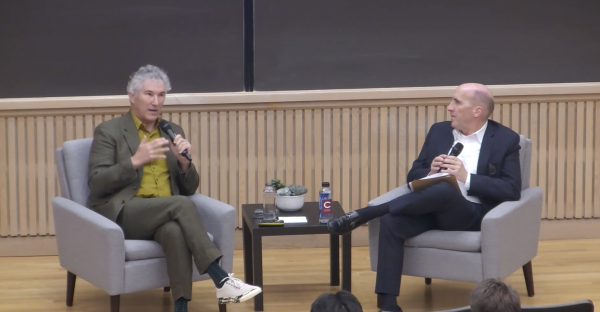Senate Seeks to Improve Campus
The Student Government Association (SGA) met on Tuesday for the second time this year to hear a report from the Constitutional Revision Committee (CRC) and to discuss the Case Library project with the University Librarian, Joanne Schneider. Senators were also briefed on parliamentary procedure and deliberated the approval of three new student organizations.
Senior Drew Lane presented the CRC’s goals for the year. He described the committee’s mission as “[working to make the SGA Constitution] perfect for the Colgate student.”
Lane listed the major problems that the CRC sees with the current constitution: it seems “patched together” and disorganized, it has no broad goals, it is inaccessible to the majority of students and it does not sufficiently define certain positions within the SGA.
The CRC plans to address these concerns with a new constitution that provides for improving the communication gap between community councils and the SGA, rectifying the lack of direction in class councils, and restructuring the Budget Allocation Committee.
Lane also said that a new constitution would explicitly define the role of “senator” and attempt to dispel the perception of the SGA as an “exclusive” organization. Finally, he said it would address the issue of disproportionate representation within the SGA.
This final point sparked some debate, but senior Justin McLeod, an off-campus senator and a member of the CRC, clarified the matter.
“Accessibility [of senators] is the most important thing, not proportionality,” he said.
When senators raised objections to some of the CRC’s plans, sophomore CRC member Rob Sobelman called for senators to visit the committee during its office hours and share their ideas.
Junior Dan Prial, a fellow committee member, also welcomed input.
“We as a committee have looked at the constitution, torn it apart, thrown it against the wall and seen what stuck,” he said. “The eight of us can’t do it alone.”
University Librarian Joanne Schneider also spoke, handing out a list of alternative study spaces at
Colgate. She reported that the temporary library at James C. Colgate Hall is now fully staffed and is open for use full time, but that the Library Automated Storage and Retrieval (LASR) system will continue to be unavailable after midnight.
“It’s innovative and it’s efficient, but we’re using it in a really unconventional way,” Schneider said of LASR.
She explained that four or five other American libraries use LASR, and only for low-use materials. A stress test conducted on the system in July showed that 160 books can be retrieved within an hour using this system, and this may prove to be a crunch for high-use volumes
during exam times.
Schneider advised students to use the Mondo server on the library’s website, (exlibris.colgate.edu), to browse for materials on-line while the collection is inaccessible to students.
She encouraged students to stop by the counter at James C. Colgate Hall and pick up a pamphlet about how LASR works.
The meeting ended with the official approval of the Colgate Libertarians Club, the Colgate Student Lecture Forum and the Colgate Poker Club.




